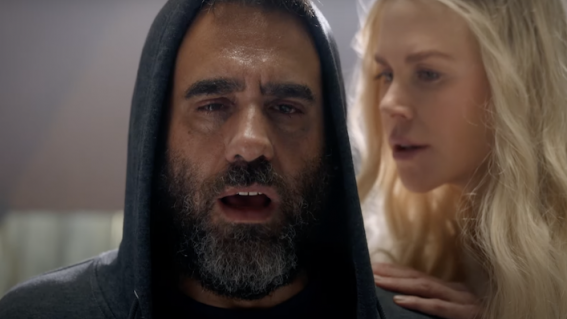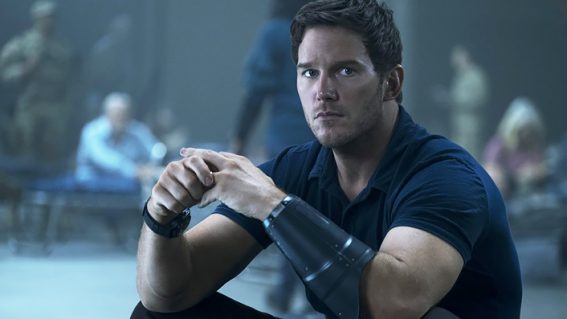Rosamund Pike is a devilish delight in comic thriller I Care a Lot

Rosamund Pike delivers a knockout performance in the darkly comic I Care a Lot (now on Prime Video), playing a slimy lawyer who scams the wrong person.
When she rocks a bob and slings acerbic dialogue, Rosamund Pike is at her best. Thanks to Gone Girl, the British actor earned an Oscar nomination for that exact combination; however she’s even sharper in I Care a Lot. It isn’t just the hair, which looks as if it’s slicing through the air around her chin. It isn’t merely the way she drips out her lines, each word flowing like honey while also stabbing like a knife. Pike’s not-so-secret skill is her ability to weaponise confidence—and, playing a professional guardian with only her own best interests at heart, she’s a cool, calm and collected slap in the face.
See also:
* All new movies & series on Prime Video
* All new streaming movies & series
An experienced hand at caring for others—legally, not physically—Pike’s character rarely needs violence to get what she wants. Skilled at sweet-talking magistrates into institutionalising well-off senior citizens, then selling off their assets and milking their savings, Marla Grayson can beam a cutting smile on demand, get anyone in a fluster with her assertiveness and—when she needs to—ooze the kind of sincerity that makes judges instantly acquiesce. But, after pulling her usual routine on Jennifer Peterson (Dianne Wiest), she attracts unwanted scrutiny. While the courts still think that Marla is a dream, crime boss Roman Lunyov (Peter Dinklage) is hardly happy about Jennifer’s new situation.

Writer/director J Blakeson already has The Disappearance of Alice Creed to his name, so he’s clearly comfortable with crime capers (his sole big-screen jaunt elsewhere, as a director-for-hire on sci-fi non-starter The 5th Wave, was outright dire). I Care a Lot is his best work yet, but not only because he’s in his element. Pitting a grifter against a gangster in a match of wits, battle of wills and ruthless game of one-upmanship, Blakeson gets gleefully dark and caustic. And, in the process, he happily savages everyone and everything that enables Marla’s gambit not just to exist, but to prosper.
The third-time feature helmer also walks a tricky tightrope, because neither of his two main characters deserves anyone’s sympathy. They don’t warrant unfettered scorn either; little is that clear-cut in Blakeson’s serrated script. Marla and Roman are equally despicable, but they’re both also capable of actually caring. The film brandishes its title with biting irony and never lets sentiment, likeability or lukewarm life lessons cloud its vision. Yet, amidst the duping and dumping (on her part) and conniving and killing (on his), the movie’s key duo have more than a cartoonish lust for power, profits and payback pumping through their veins.
Although turning guardianship fraud into a blackly comic thriller might sound awkward and uncomfortable—and, given such exploitation happens in real life, somewhat callous—I Care a Lot is astute, smart and engaging. It doesn’t evade the unpleasantness that comes with its concept, because that’s Blakeson’s point. Confronting the realities of capitalism, corporate power, government indifference and the lack of care afforded the vulnerable by the more fortunate shouldn’t be easy, and nor should it be avoided. Indeed, I Care a Lot so frequently doubles down on its twisted observations, and on its characters’ immoral wheeling and dealing as well, that it’d be devastating if it wasn’t so devilishly shrewd and entertaining.
There’s a devil-may-care vibe to the film’s style. Blakeson’s choice of cinematographer can’t be underestimated, with Sorry to Bother You’s Doug Emmett in familiar thematic territory. Here, he bounces a slick gleam across even the uneasiest of scenes, as aided by Mark Eckersley’s pacy edits. Nothing that glitters is gold, of course; rather, it’s soulless, materialistic and emblematic of a world that values appearances, ease and money over doing the right thing.
Voiced by Pike, I Care a Lot’s narration helps emphasise the above messages. As well as overtly aping Gone Girl, it often tells rather than shows and can feel like overkill. Marla doesn’t need to explain that she’s a lioness rather than a lamb, for example, although it’s hard to fault Blakeson’s desire to let Pike spout such lines. He hasn’t penned her a “cool girl” monologue, but she’s just as icy.
Captivating from start to finish, Pike is the film’s chilly core. She’s also in terrific company. Her face-offs with Dinklage snap, crackle and pop, and she enjoys the feature’s warmest rapport with Eiza Gonzalez, who plays Marla’s professional and romantic partner. Wiest screams for more screen time, especially when Jennifer shows that she can match her guardian’s manipulations, while Chris Messina and Macon Blair both make the most of small but crucial parts. Scams like Marla’s, societies like ours and movies like I Care a Lot don’t exist in a bubble, after all—and Blakeson doesn’t let his audience forget it.















